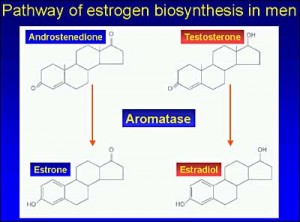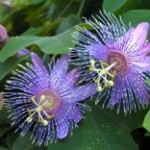Prostate problems such as benign prostatic hyperplasia (BPH), prostatic intra-epithelial neoplasia (PIN), prostatitis and prostate cancer have been recognized as problems largely related to androgens (male sex hormones) and genetic factors. All men will develop prostate cancer if they live long enough. Prostate cancer is somewhat unusual, compared with other types of cancer. More than 95% of prostate cancers are adenocarcinomas, cancers that develop in glandular tissue. Male hormones such as testosterone are generally believed to be causatively associated with prostate cancer. We know that testosterone stimulates the prostate to grow. But, several recent studies show that a man’s susceptibility to prostate cancer may be influenced more by his exposure to the female hormone, estrogen, than to the male hormone, testosterone.
A small amount of estrogen (female sex hormone) is necessary in men to prevent bone loss and for sex drive. Progesterone is produced in small amounts in men too. Progesterone has its reputation as a female hormone due to its role in promoting pregnancy. But natural progesterone is as vital for men’s health as it is for women’s.; this however has not yet been made totally clear. When it comes to men and progesterone, progesterone protects men against excessive estrogen. Like women, men are also at risk of becoming estrogen dominant, and the symptoms, although different from women’s, can also be dire.
As men age, progesterone levels fall, testosterone becomes converted to dihydrotestosterone (DHT) and estrogen levels rise and become dominant. A healthy male has approximately 1000 to 1200 nanograms/dl of testosterone at the age of 20. After the age of 35 there is a steady decline in these levels. By the age to 40 to 50 one sees a significant drop in these levels. By the age of 80 these levels decline to pre-puberty levels of 100 to 200 nanograms/dl. The effect of this is weight gain, some breast enlargement, an enlarged prostate gland and sometimes prostate cancer. DHT acts on the skin, sometimes producing acne, and on the hair follicles, putting hair on the chest but often taking it off the scalp. Male-pattern baldness (androgenic alopecia) is one thing, prostate disease quite another. The conversion of testosterone to DHT is promoted by the enzyme 5-alpha-reductase. This is important since testosterone antagonizes and limits estrogen effects, thus preventing prostate cancer.
Diet, Obesity, and Prostate Health: Are We Missing the Link?
Hormones and prostate carcinogenesis: Androgens and estrogens.
Aromatase and regulating the estrogen:androgen ratio in the prostate gland.
The dual, opposing roles of estrogen in the prostate.
5alpha-reductase isozymes and androgen actions in the prostate.
Aromatic esters of progesterone as 5alpha-reductase and prostate growth inhibitors.
We know that too much estrogen and progesterone will lead to loss of muscle mass, gains in fat and loss of libido. At the right levels, but more importantly the ratio/proper balance of these hormones could actually be beneficial for libido, prostate health, cardiovascular health and body composition. However, we are continuously surrounded by environmental pollutants that have estrogen-like activity called Xenoestrogens, which are primarily petrochemical origin. Our diet is also contaminated with hormones. Synthetic estrogens are now used to fatten cattle, as well as other meat-producing animals, and to increase milk and egg production. Synthetic hormones have molecular structures that are not compatible with our physiology. We do not have enzymes designed to modify their effects, nor can they be efficiently excreted. Therefore, these synthetics can have an unnatural and far more potent hormonal effect on our body systems than natural hormones. Today millions of men young and old suffer from disorders related to hormone imbalance due to the high levels of estrogen in our diet and the environment. This has affected approximately 50% men above the age of 40 years and 80% above the age of 70 years. In short, hormone imbalance has reached epidemic proportions.
Environmental signaling: what embryos and evolution teach us about endocrine disrupting chemicals.
Endocrine dismodulation and cancer.
 Hormones impact the body at the cellular level. Overall health depends to a large degree on the body’s ability to maintain healthy cells. Dietary changes and deep breathing exercise influence hormones and the body’s ability to balance them naturally. This applies to both men and women of all ages. The elements of natural prostate cancer therapy are include: dietary changes, possible hormonal balancing, vitamin D and mineral supplements, oral herbalzym supplements, deep breathing exercise program, fresh air and some sunlight exposure, stress management training if necessary, detoxification, and immune enhancing herbalzym-diet.
Hormones impact the body at the cellular level. Overall health depends to a large degree on the body’s ability to maintain healthy cells. Dietary changes and deep breathing exercise influence hormones and the body’s ability to balance them naturally. This applies to both men and women of all ages. The elements of natural prostate cancer therapy are include: dietary changes, possible hormonal balancing, vitamin D and mineral supplements, oral herbalzym supplements, deep breathing exercise program, fresh air and some sunlight exposure, stress management training if necessary, detoxification, and immune enhancing herbalzym-diet.
The equilibrium of sexual hormones in both sexes is controlled in vertebrates by the enzyme aromatase which catalyzes the conversion of androstenedione and testosterone into estrone and estradiol, respectively. Chrysin is a flavonoid derived from the blue passion flower (Passiflora coerulea). Small amounts are also found in honey and in propolis. The ability of chrysin to inhibit aromatase and estrogen production has been repeated in various studies over the years, and pharmaceutical companies are also interested in the cancer-fighting abilities of this natural substance. A recent study further supports the value of chrysin as an anti-cancer agent. Chrysin also has antioxidant properties and is an effective anti-inflammatory agent. Some bodybuilders say they take chrysin because it reportedly boosts testosterone levels, but no studies have verified this claim.
 There are a number of supplement companies that sell chrysin pills. Unfortunately it is recognized that the therapeutic effectiveness of chrysin is limited due to its low solubility and poor absorption from the GI tract, which means that most of what you swallow goes directly into gastrointestinal area and is expelled. Very little remain in the bloodstream about an hour or so after ingestion. So the use of the natural fermentation to enhance its uptake is particularly beneficial. ProstaZym contains enzymatic fermented chrysin. It has perfect bioavailability and pharmacokinetics of active chrysin. ProstaZym greatly improve the cellular uptake of chrysin, with clinically validated efficacy in prostate cancer treatment.
There are a number of supplement companies that sell chrysin pills. Unfortunately it is recognized that the therapeutic effectiveness of chrysin is limited due to its low solubility and poor absorption from the GI tract, which means that most of what you swallow goes directly into gastrointestinal area and is expelled. Very little remain in the bloodstream about an hour or so after ingestion. So the use of the natural fermentation to enhance its uptake is particularly beneficial. ProstaZym contains enzymatic fermented chrysin. It has perfect bioavailability and pharmacokinetics of active chrysin. ProstaZym greatly improve the cellular uptake of chrysin, with clinically validated efficacy in prostate cancer treatment.
Flavonoid inhibition of aromatase enzyme activity in human preadipocytes.
Effects of chrysin on urinary testosterone levels in human males.
Since palm kernel oil and coconut oil have very high contents of lauric acid, they are referred to as lauric oils. Lauric acids block the conversion of testosterone to 5alpha-dihydrotestosterone (DHT) and then inhibit the proliferation of prostate cancer cells.